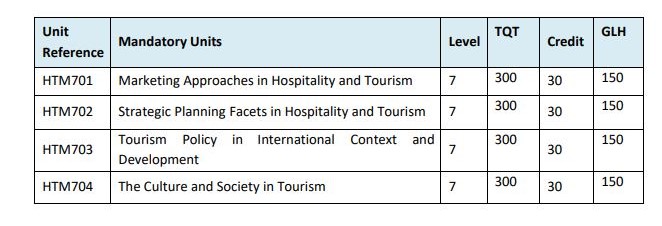Level 7 Diploma in Hospitality and Tourism Management
This qualification has been created to develop and reward the business managers of today and the future, and to continue to bring recognition and professionalism to the management sectors.
Intake
October
EQF / MQF Level
Level 7
Mode of Delivery
Traditional
Duration of Course
1 Academic Year – Part-Time, 3-hours, Twice a Week
Operational End Date
N/A
N/A
ECTS Credits
120 UK Credits (equivalent to 60 ECTS)
Programme Qualifies for
Get Qualified Scheme
Certificate after completing
Student Success Rate
100
Intake
October
EQF / MQF Level
Level 7
Mode of Delivery
Traditional
Duration of Course
1 Academic Year – Part-Time, 3-hours, Twice a Week
Operational End Date
N/A
N/A
ECTS Credits
120 UK Credits (equivalent to 60 ECTS)
Programme Qualifies for
Get Qualified Scheme
Certificate after completing
Student Success Rate
100
Course Description
The Level 7 Diploma in Hospitality and Tourism Management qualification is designed for managers who have the expert and personal encouragement in deciphering organisational strategy into effective operational performance. This programme provides learners with an advanced qualification that supports their development as managers within the tourism and hospitality industry through a lifelong-learning orientation.
Target Group:
This qualification has been created to develop and reward the business managers of today and the future, and to continue to bring recognition and professionalism to the hospitality and tourism management sectors.
Target Audience:
- 21+
Course Language:
English
Where you will learn:
What you will study
How will you learn
Extensive course material is provided and you shall also be given access to our fully-fledged online library. For each module completed, an online self-assessment test is automatically available to you so that you gauge your preparedness to start the assignment for that particular module. The assignment is sent to you by Domain Academy’s Academic Office. Once you complete the assignment you submit it online to Domain Academy’s Academic Office. Once corrected, the result shall be sent to you. At the end of each module and after completing the self-assessment test, you shall be automatically provided with a certificate of completion for that particular module. However, this certificate does not count for ECTS credits. It is the assignment which is considered as the official mode of assessment for that particular module and therefore counts towards ECTS credits. Once the whole programme is completed, you shall be awarded an official certificate by Qualifi (UK) certifying that you completed this accredited and recognised qualification.
Where you will learn:
Lessons will be held in class in our premises at Domain Building, 102/104, Constitution Street, Mosta.
Assessment
Assessments will be designed according to the guidelines of each module specification. In general, the assessments will enable learners to demonstrate achievement of learning outcomes across the individual elements of the programme. The range of assessments utilised will normally include: essays, reports, presentations and other structured assignments and examinations.
Assessments are drafted in conjunction with the curriculum development department and tutor concerned. Final version is confirmed by the curriculum development department.
Assessments are moderated by tutor concerned, then also verified by the Internal Verifier.
Entry Requirement
The qualification has been designed to be accessible without artificial barriers that restrict access and progression. Entry to the qualification will be through centre interview and learners will be expected to hold the following:
- Level 6 Qualification or;
- First Degree.
In certain circumstances, managers with considerable experience but no formal Qualifications may be considered, subject to interview and being able to demonstrate their ability to cope with the demands of the programme.
In the case of applicants whose first language is not English, then IELTS 6 (or equivalent) is required.
International Qualifications will be checked for appropriate matriculation to UK Higher Education postgraduate programmes. The applicants are normally required to produce two supporting references, at least one of which should preferably be academic.
Fees & Funding
MFHEA Licence Nº: 2011 – TC – 01
Further and Higher Education Institution
Listen to what our past students had to say;
Domain Academy proudly collaborates with:




28 Years
of Excellence
8,000+
Satisfied Alumni
98%
Student Success Rate
250+
Active Students


















